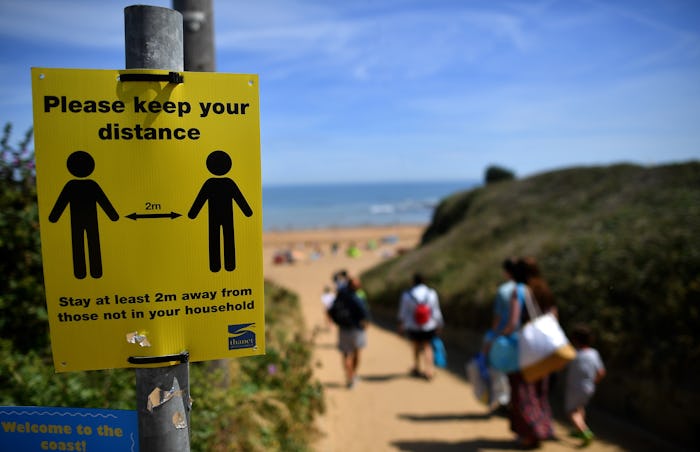Life

Is It Safe To Take Kids To The Beach This Summer? Here's What The Experts Say
Many camps are canceled this summer, with big group activities like picnics and parties postponed indefinitely (ugh). But if you have an annual vacation planned or you’re just looking for ways to beat the heat that don’t involve kiddie pools in the backyard, you're probably wondering: Is it safe to take kids to the beach this summer? The answer is complicated, experts say, but if you take the proper precautions, a beach day could be relatively low-risk.
“It should be safe to go to a beach,” pediatrician Alison Mitzner M.D. tells Romper. "The most important thing to remember when going to the beach is to maintain social distancing. Avoid crowds. That is the bigger risk. A walk on the beach to get exercise is a great idea as long as you're able to keep the distancing."
Many people think that the wind at the beach poses a risk in spreading respiratory droplets through the air, but Gabriela Andujar Vazquez M.D., an infectious disease physician and associate hospital epidemiologist at Tufts Medical Center, tells Romper that's not necessarily the case. "Droplets won’t fly all over, they’re too dense to fly in the wind," Dr. Andujar Vazquez says. "Gravity will pull [the droplets] down. It’s different for airborne diseases like measles which truly produce an aerosol which stays in the air." She adds that if you're planning to go anywhere outside your home, "outdoor, open spaces are the ideal environment to be in."
However, it's still essential to practice social distancing on the sand and in the water, even when you're in an open outdoor area like the beach. "Avoid gatherings in groups and stay with your own immediate household and at least 6 feet away from others. Be sure to have hand sanitizer with at least 60% alcohol in the case that soap and water is not available, [which is] often the case at beaches," Dr. Mitzner says. It's also important to avoid sharing food, utensils, and sand toys with people outside of your "bubble."
Swimming might not pose a particular hazard, Dr. Mitzner adds, as it's "thought that the virus would dilute quickly [in water] so [you're] unlikely to be infected that way." The public bathroom at the beach, on the other hand, might be a riskier prospect. Dr. Mitzner recommends using a tissue or gloves for opening door handles and, of course, washing hands with soap and using hand sanitizer.
As for the playground at the beach (assuming there is a playground), Dr. Mitzner says to avoid it altogether. "It's hard to keep clean and maintained, and kids are likely to touch their eyes, mouth or eyes," she explains. "You also want to avoid group sports and activities."
Remember to check in with your local beach too, as every state (and even every county) has their own unique protocols and requirements in places. In some areas, the beaches may not be open.
Overall, the beach is a safer choice than, say, a gathering in a friend's backyard where everyone is in close quarters... but it's not risk-free. At the beach, you're not "as exposed as you would be in a non-ventilated, windowless space," Dr. Andujar Vazquez says. The risk of taking little ones to the beach stems more from kids' limited ability to distance from others than anything else (and other people's limited ability to distance from you). So if you can trust that your child understands the importance of staying away from other groups, not sharing toys and food, and coughing or sneezing into their elbow, and the beach isn't totally packed, then a day at the shore could be in the cards.
Experts:
Alison Mitzner M.D., pediatrician
Gabriela Andujar Vazquez M.D., infectious disease physician and associate hospital epidemiologist at Tufts Medical Center
This article was originally published on